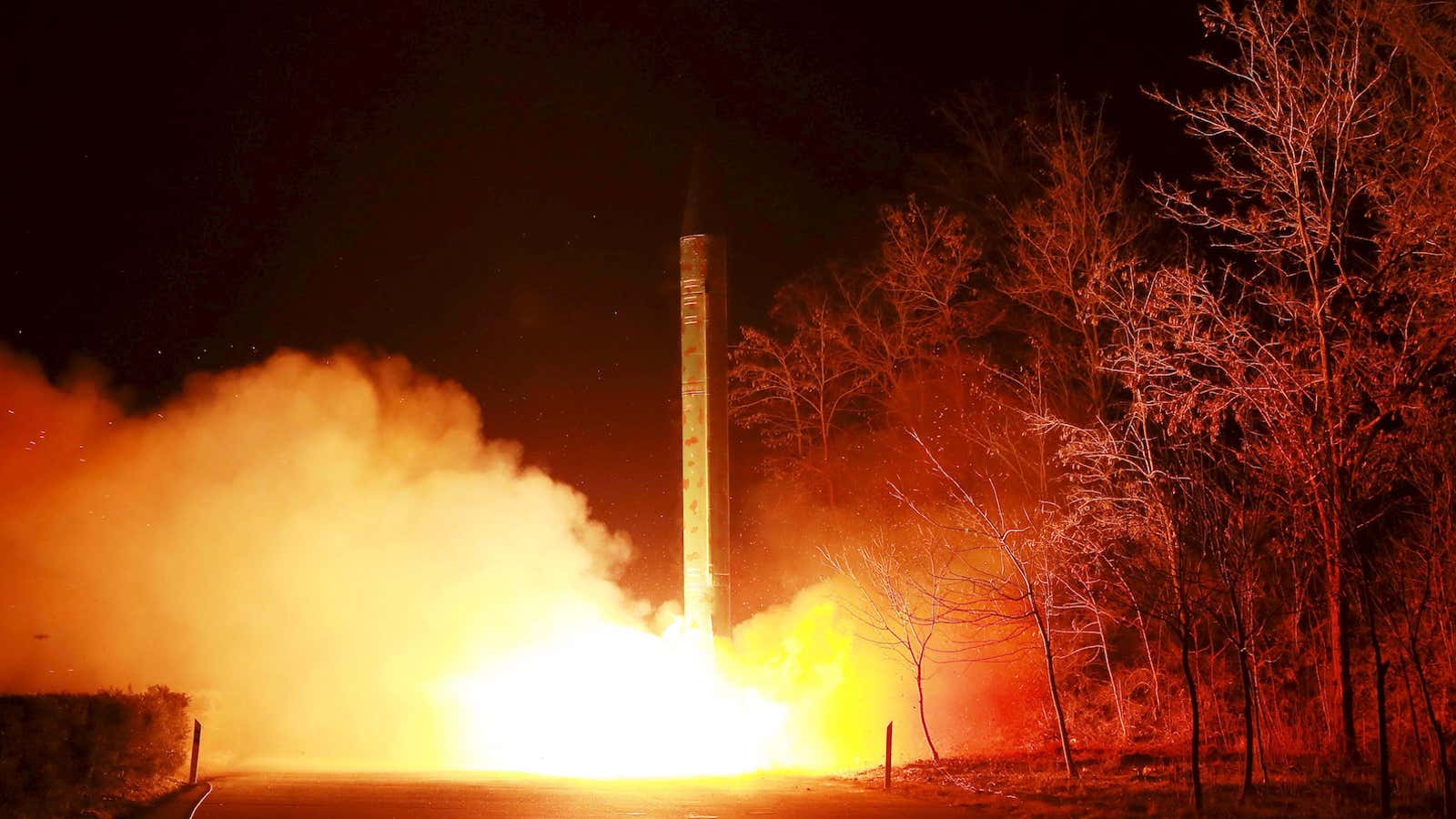“There are no secrets about the world of nature,” said Robert Oppenheimer, the theoretical physicist and father of the atom bomb. “There are secrets about the thoughts and intentions of men.”
And in the mind of US president-elect Donald Trump? His intentions truly are secret, and our lack of certainty about them means his election makes it more likely that humanity will perish in a catastrophic event of some kind. That’s according to Seth Baum, the executive director of the Global Catastrophic Risk Institute, one of a handful of think-tanks around the world dedicated to the “existential risks” to mankind—in essence, to saving the human race from destroying itself.
Writing in the Bulletin of the Atomic Scientists—keeper of the Doomsday Clock, which was created in 1947 to illustrate how close we are to perishing in nuclear war—Baum said Trump’s “tendency toward erratic behavior, combined with a mix of difficult geopolitical challenges ahead, mean the probability of a nuclear launch order will be unusually high.”
“Maybe you could be pleasantly surprised, and that would be great, but if things are on the bad end of what you’d expect, that’s a real problem,” Baum told Quartz.
Anders Sandberg, a senior researcher at Oxford’s Future of Humanity Institute, which is charged with the same mission of preventing global catastrophe, agreed that that the existential risk to humanity had increased in the weeks since Trump’s election.
“Even acts of speech have consequences, and his statements on NATO and call with Taiwan have already reduced stability in the world system,” said Sandberg, who wears a cryonics medallion around his neck with instructions to freeze him in the event of his death and revive him in a hopefully more enlightened future.
Trump annoyed China by speaking with Taiwan’s president, the first president or president-elect to do so since 1979, and has questioned whether the US should rush to defend NATO allies in Europe if attacked—the founding principle of the transatlantic organization.
“It remains the case that a large number of voters decided to vote for a candidate who is rather unusual, shall we say,” Baum said. He continued:
“I want to give at least a portion of Trump voters credit for being willing to try something new. In this great experiment of democracy, we need to keep experimenting. But I would say be careful with the sorts of experiments you’re inclined to run because if you press the wrong buttons, bad things can happen.”
Quite literally. Once Trump has access to the “football,” as the briefcase that holds the US nuclear codes is called, he will have the unilateral authority to launch a nuclear strike at will. When asked about whether he would use nuclear weapons, Trump has previously replied, “I just don’t want to talk about it. It is highly, highly, highly, highly unlikely that I would ever be using them.”
His opponent felt it should never have come to this. “This is not someone who should ever have the nuclear codes,” Hillary Clinton once said. “It’s not hard to imagine Donald Trump leading us into a war just because somebody got under his very thin skin.”
This could get a little bumpy
Amid the discussion of what it means that almost 63 million Americans voted for a man who has shown a lack of respect for democratic norms, such as hinting at “rigged” elections and vowing to jail his opponent, Baum also fears the possibility of an authoritarian, dictatorial United States of America under Trump. This has been a growing concern among many liberals as the election loomed—The New Yorker’s editor, David Remnick, wrote after Trump’s election (paywall), ”Fascism is not our future—it cannot be; we cannot allow it to be so—but this is surely the way fascism can begin.”
Baum believes that an authoritarian America could “wield overwhelming military and intelligence capabilities to even more disastrous effect.” Why would that be an inherently bad thing for humanity, given that modern notions of democracy are only a few centuries old and the US’s so-called peer adversaries—countries with similar levels of military and geopolitical power—are China and Russia, which are certainly not democracies?
“There are some ways in which an authoritarian government could be a good thing,” Baum agreed, but added:
“So if you had a capable, benevolent dictator, then maybe that could even outperform democracy, in certain regards. But on the other end of the spectrum, you can much worse results, as we have seen with Hitler and the Nazis, from Stalin and the Soviet Union, from Mao in China, where just tens of millions of people died. That’s the sort of thing much less likely to happen in a democracy.”
In short, he said, “the more centralized the power, the wider the variance in performance, because it becomes more and more sensitive to the whims of whoever is in charge.”
In Trump’s case, according to Sandberg, the US is at the whim of a classic example of what former Princeton professor Harry Frankfurt defined as a bullshitter. ”The Cold War has many examples of misunderstandings escalating to dangerous levels,” he said. “A leadership that is unclear, apparently unschooled in geopolitics, and assertive may hence trigger dangerous crises.”
In the case of Oppenheimer’s deadly invention, the only thing that could stop Trump from launching a nuclear missile is a key person in the chain of command refusing to follow the order. That was what happened in the case of Vasili Arkhipov at the height of the Cuban missile crisis in 1962, or Stanislav Petrov, who was the duty officer in a bunker near Moscow in 1983 when his computer falsely told him that the US had just launched four nukes at the Soviet Union. Petrov ignored the alarm.
Let’s hope it doesn’t come to that.
